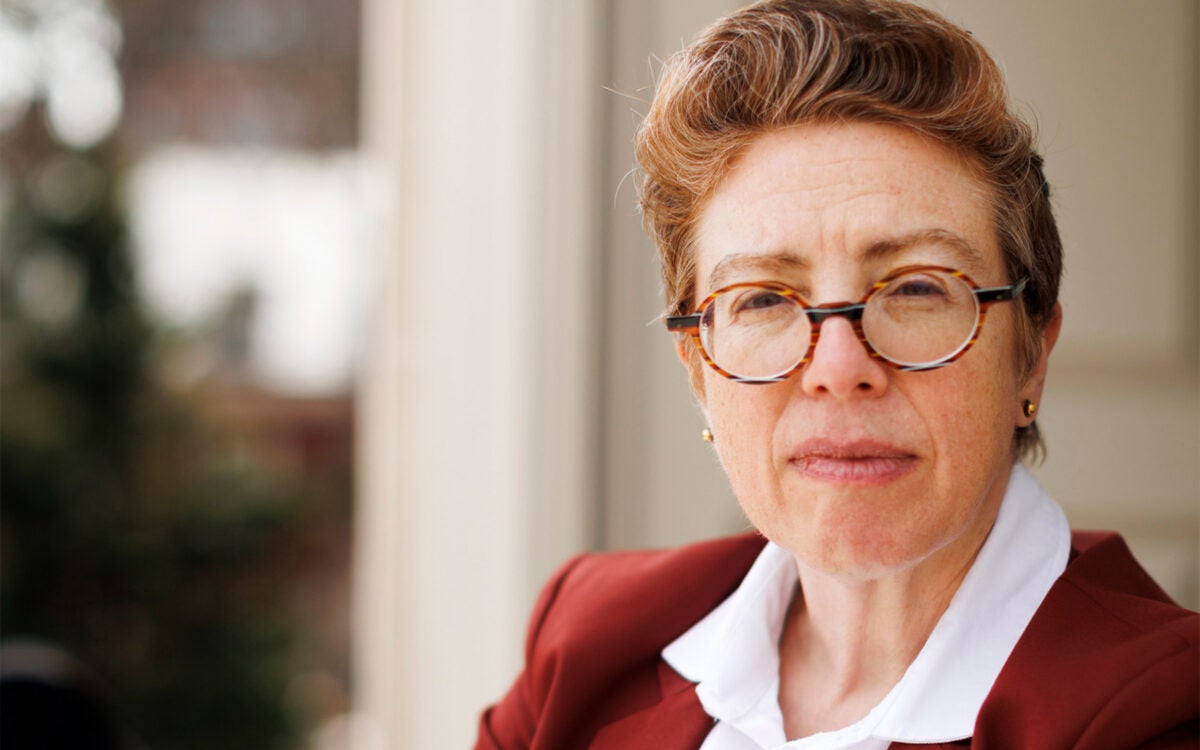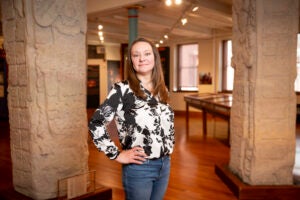Tag: Research
-
Arts & Culture
Project on Soviet Social System goes online
or decades, the Harvard Project on the Soviet Social System (HPSSS) has been a major source of information for researchers analyzing the Soviet Union between World War I and World War II. Due to its archaic and often-confusing indexing system, though, the HPSSS has also been a source of frustration for researchers trying to comb…
-
Campus & Community
‘Symbiotic’ Web archive launched
A new Web archive created by faculty, students, and librarians at Harvard brings original research on Leonard Bernstein and his Boston roots to the public for the first time. The material, which went live on the Web on Jan. 23, was collected during undergraduate seminars and over the course of an international Bernstein Festival at…
-
Campus & Community
Harvard joins Newberry Consortium in American Indian Studies
Harvard University is the most recent member of the Newberry Consortium in American Indian Studies (NCAIS). The NCAIS, inaugurated in June 2008 by the Newberry Library in Chicago, is composed of 10 research universities that have faculty expertise in the field of American Indian Studies. Harvard was inducted Dec. 1.
-
Campus & Community
HSPH’s David Bloom chosen for global health research group
Renowned health economist and demographer David Bloom, chair of the Department of Global Health and Population at the Harvard School of Public Health and Clarence James Gamble Professor of Economics and Demography, has been selected to join a group of 25 ambassadors in the Paul G. Rogers Society for Global Health Research with Research!America.
-
Science & Tech
Exotic force seen for first time
For the first time, researchers have measured a long-theorized force that operates at distances so tiny they’re measured in billionths of a meter, which may have important applications in nanotechnology as scientists and engineers seek new ways to create devices too small for the eye to see.
-
Arts & Culture
Isolating creativity in the brain
How — exactly — does improvisation happen? What’s involved when a musician sits down at the piano and plays flurries of notes in a free fall, without a score, without knowing much about what will happen moment to moment? Is it possible to find the sources of a creative process?
-
Science & Tech
Global temp analysis clarifies warming details
An analysis of global temperatures between 1850 and 2007 has illuminated some climate change details, showing that winter temperatures have risen more rapidly than summer temperatures and that the seasons are coming nearly two days earlier than they were 50 years ago.
-
Health
Gene therapy demonstrates benefit in patients with rheumatoid arthritis
Researchers have reported the first clinical evidence that gene therapy reduces symptoms in patients with rheumatoid arthritis (RA), an important milestone for this promising treatment . Described in the February issue of the journal Human Gene Therapy, the findings stem from a study of two patients with severe rheumatoid arthritis conducted in Germany and led…
-
Health
Blavatnik Family Foundation gives Harvard $10M
The Blavatnik Family Foundation, headed by Len Blavatnik, M.B.A. ’89, has given Harvard University two gifts totaling $10 million in support of its scientific and technological research. Half the gift will go to the Eli and Edythe L. Broad Institute of Harvard and MIT to support cancer vaccine research, and half will go to the…
-
Health
Neural mapping paints a haphazard picture of odor receptors
Despite the striking aromatic differences between coffee, peppermint, and pine, a new mapping of the nose’s neural circuitry suggests a haphazard patchwork where the receptors for such disparate scents are as likely as not to be neighbors.
-
Health
$100 million gift to launch innovative search for AIDS vaccine
Medical School Professor Bruce Walker has been selected as the founding director of a unique new $100 million effort to finally develop a vaccine that can halt the global HIV/AIDS pandemic that, if it continues unchecked, is predicted to claim an additional 70 million lives by 2020.
-
Campus & Community
HKS, Stanford collaborate on poverty project
A new collaborative effort bringing together faculty and scholars from Harvard and Stanford universities is being launched to evaluate — and develop — national policy on poverty and inequality in America. The Collaboration for Poverty Research (CPR) will tap the vast intellectual resources of both institutions, leveraging their combined power to focus attention and garner…
-
Campus & Community
Harvard Magazine site revamped
The Web site for Harvard Magazine, Harvard’s alumni publication, has also been revamped to better reflect its glossy and colorful magazine format. The site now features entire issues online, flashing dynamic graphics, and audio and video clips that enhance articles. Alumni who browse the Web site are greeted with the latest-breaking news at Harvard, including…
-
Science & Tech
‘Bicycle Environments’ takes HSPH and GSD students for a ride
At a time when the United States scrambles to resolve the country’s obesity epidemic, reduce greenhouse gas emissions and air pollution, and lessen dependency on foreign fossil fuels, this semester the Harvard School of Public Health (HSPH) and the Graduate School of Design (GSD) have launched an interdisciplinary course that tackles all three problems (and…
-
Health
Antacid use during pregnancy may increase childhood asthma
Children of mothers who took acid-suppressive drugs during pregnancy had a 1.5 times higher incidence of asthma when compared with children who were not exposed to the drugs in utero, finds a large population-based study by researchers at Children’s Hospital Boston. The findings, accompanied by an editorial, appear online this week in “Early View” in…
-
Health
New obesity-related genes identified
A large international consortium has made significant inroads into uncovering the genetic basis of obesity, adding six new genetic variants to the two already linked to higher body mass index (BMI) in previous studies. Most of the newly discovered genes had never before been suspected of having a role in body weight and, curiously, many…
-
Health
Pain is more intense when inflicted on purpose
Researchers at Harvard University have discovered that our experience of pain depends in part on whether we think someone caused the pain intentionally. Participants in a study who believed they were getting an electrical shock from another person on purpose, rather than accidentally, rated the shock as more painful than those receiving the same shock…
-
Science & Tech
Robotic radical hysterectomy has advantages
New technologies now allow surgery to be performed with less impact on patient quality of life. As the trend toward minimally invasive surgery grows, robotic-assisted surgery has become an appealing tool for gynecologic oncology surgeons. However, to date, there is little data to confirm the benefits of this technology. New research from Brigham and Women’s…
-
Science & Tech
Idle computing power may ID candidate molecules for efficient solar panels
The world today uses enough power to illuminate 150 billion light bulbs for a year. According to some estimates, by 2050, demand will double, creating irreversible climate change without reductions in humanity’s carbon output.
-
Campus & Community
Algebra, topology expert Lurie named professor of mathematics
Mathematician Jacob Lurie, whose expertise ranges across algebraic geometry, topology, and algebra, has been named professor of mathematics in Harvard University’s Faculty of Arts and Sciences, effective July 1, 2009.
-
Science & Tech
Researchers study glaciers on Earth’s coldest desert
It’s December, and undergraduate Jenny Middleton bundles up to face the cold. While all across campus, students, and faculty don their winter gear, Middleton is not preparing for the New England winter; she is preparing for an expedition through the Earth’s coldest desert: the McMurdo Dry Valleys in Antarctica.
-
Science & Tech
Climate options must include ‘all of the above’
Climate change has so much momentum behind it that “either/or” discussions about options are meaningless because it’ll take all we can do just to arrest carbon dioxide at levels double those in preindustrial times, a top climate scientist said Dec. 11.
-
Campus & Community
Lawrence Lessig receives two Harvard appointments
Renowned legal scholar Lawrence Lessig has been appointed to the faculty of Harvard Law School, and as the faculty director of Harvard University’s Edmond J. Safra Foundation Center for Ethics.
-
Campus & Community
In brief
Requests for HSPH Distinguished Alum Award nominations; Holiday gifts for those in need
-
Campus & Community
Harvard welcomes 2008-09 Fulbright Scholars
Twenty-nine foreign scholars and professionals have been named Fulbright Scholar Program grant recipients for the 2008-09 academic year. Sponsored by the U.S. Department of State, participating governments, and host institutions in the United States and abroad, these grants allow scholars from across the globe to lecture or conduct research at the University.
-
Health
Researchers replicate ALS process in lab dish
A Harvard Stem Cell Institute (HSCI) research team has succeeded in deriving spinal motor neurons from human embryonic stem cells, and has then used them to replicate the Amyotrophic Lateral Sclerosis (ALS) disease process in a laboratory dish.
-
Health
Researchers successfully track voyage of single stem cell
The title of the letter in the Dec. 3 edition of the journal Nature — “Live-animal tracking of individual haematopoietic stem/progenitor cells in their niche” — doesn’t begin to describe it, this real-life, real-time view of a single stem cell making its way to its ultimate home inside the bone-marrow cavity of a living mouse.
-
Health
Rights, AIDS, past and future
Sixty years after the United Nations declared health care a basic human right, the AIDS epidemic highlights how much work remains to be done as the disease rages on among populations with little access to quality care.
-
Health
Research may lead to treatment for retinitis pigmentosa
Rods and cones coexist peacefully in healthy retinas. Both types of cells occupy the same layer of tissue and send signals when they detect light, which is the first step in vision.


